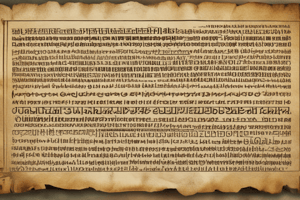Podcast
Questions and Answers
Who is credited with proving that the skull found represents the early Filipino race?
Who is credited with proving that the skull found represents the early Filipino race?
- Felipe Landa Jocano (correct)
- Dr. Armand Mijares
- Peter Bellwood
- Wilheim Solheim II
What was the primary aim of the Spanish during their colonization of the Philippines?
What was the primary aim of the Spanish during their colonization of the Philippines?
- Promote local languages
- Spread Christianity (correct)
- Establish trade
- Cultivate rice terraces
Which archaeological find is older than the Tabon Man?
Which archaeological find is older than the Tabon Man?
- Homo Sapiens
- Homo Erectus
- Kuweba ng Callao (correct)
- Peking Man
What is the meaning of 'Austronesian' in the context of Filipino ancestry?
What is the meaning of 'Austronesian' in the context of Filipino ancestry?
Who wrote the 'Doctrina Christiana'?
Who wrote the 'Doctrina Christiana'?
What is the main reason for the creation of different languages according to the Tower of Babel story?
What is the main reason for the creation of different languages according to the Tower of Babel story?
Which hypothesis suggests that language originated from the sounds of nature?
Which hypothesis suggests that language originated from the sounds of nature?
What does the Wave Algorithm Theory proposed by Dr. Henry Otley Beyer primarily describe?
What does the Wave Algorithm Theory proposed by Dr. Henry Otley Beyer primarily describe?
Which of the following theories relates to the sound expressions of strong feelings as a source of language?
Which of the following theories relates to the sound expressions of strong feelings as a source of language?
According to the content, what material was used to construct the Tower of Babel?
According to the content, what material was used to construct the Tower of Babel?
Flashcards are hidden until you start studying
Study Notes
Origins of Language
- Theologians believe the origins of language are found in the Bible, specifically in Genesis.
- Genesis 2:20 mentions that Adam named all animals, establishing a connection between language and naming.
- The Tower of Babel story in Genesis 11:1-9 illustrates that languages diversified when God confused human speech.
The Tower of Babel
- Humanity originally spoke one language and sought to build a city with a tower to reach the heavens.
- God intervened by confusing their language, leading to the dispersal of people across the Earth.
- They used bricks and tar for construction.
Evolution of Language Theories
- Anthropologists suggest human thinking evolved over time, leading to the emergence of sophisticated languages.
- Ding Dong Theory: Language originates from natural sounds (e.g., "splash").
- Bow-Wow Theory: Language is derived from animal sounds (e.g., "quack").
- Pooh-Poo Theory: Language arises from intense feelings (e.g., "ouch").
- Ta-Ta Theory: Language develops from hand gestures combined with speech.
- Yo-He-Ho Theory: Language is born from communal effort (e.g., lifting heavy objects).
History of National Language
Indigenous Period
- Wave Algorithm Theory by Dr. Henry Otley Beyer claims the first settlers in the Philippines were Negritos, Malays, and Indonesians.
- Tabon Cave discoveries in 1962 linked the earliest humans in the Philippines to the local ancestry.
- Homonid remains found in the Philippines date back to between 50,000 and 67,000 years ago—specifically, Homo luzonensis.
Migration from Austronesia
- "Auster" (south wind) and "nesos" (island) indicate Austronesian origins.
- Wilheim Solheim II is recognized as the father of archaeology in this context.
- Peter Bellwood suggests migration from southern China and Taiwan around 5000 BC.
Spanish Colonial Period
- Indigenous people were labeled as barbaric, uncivilized, and pagan by Spaniards.
- The primary goal of the Spanish was to spread Christianity, leading to a suppression of native languages.
- Five religious orders established schools to promote the learning of Spanish and local languages.
- Instruction in Spanish was mandated, creating a bilingual education system.
Failure of Spanish Policy
- Despite efforts, the Spanish language teaching initiatives often failed to take root.
- The Doctrina Christiana, written in Spanish, was suggested for education promotion.
Revolutionary Period
- The rise of nationalism in the Philippines peaked during the late Spanish period.
- Andres Bonifacio established the Katipunan, proposing Tagalog as the official language for governance and expression.
- The Constitution of Biak-na-Bato recognized Tagalog, but it didn't declare it a national language.
American Colonial Period
- Following Spanish colonization, American forces introduced English as a dominant language in education.
- English was mandated as the medium of instruction across all educational levels.
- The 1901 Act No. 74 established English as the language of instruction and resulted in the widespread use of the three R's: reading, writing, and arithmetic.
Recommendations for Language Use
- Following the transition to American rule, recommendations were made to incorporate regional vernaculars alongside English.
- The administration encouraged the inclusion of bilingual textbooks, linking various regional languages with English.
Factors Promoting English Use
- Difficulty in communication across regions due to diverse local languages justified the promotion of English.
- English was seen as crucial for national unity, cultural growth, and access to global commerce.
- Significant expenditures on English education highlighted it as a national priority for coherence in societal communication.
Factors Supporting Vernacular Use
- Most Filipino students only achieved up to the fifth grade, making English instruction inefficient.
- Instruction in vernaculars was deemed more effective for primary education.
- Establishing a common language was necessary to cater to the majority of Filipinos.
Language Bill Development
- Filings for national language establishment occurred, leading to the creation of the National Language Commission on November 13, 1936.
- The Commission was tasked with researching the official national language selection process.
Studying That Suits You
Use AI to generate personalized quizzes and flashcards to suit your learning preferences.




